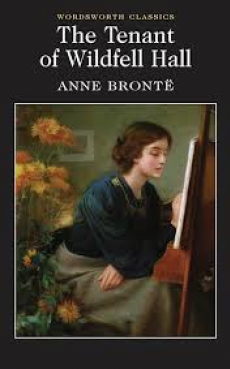
The Tenant of Wildfell Hall is a well-known, gothic Victorian novel, written by Anne Bronte. The author is the sister of Charlotte Bronte, who wrote Jane Eyre, and Emily Bronte, of Wuthering Heights fame. When the book came out in 1848, it was seen as shocking by a large amount of people. This is because it contains things that were seen as dangerous at the time – independent women, single mothers and the horrifying description of alcoholism would have shocked readers. The novel is basically one long letter from the main male character, Gilbert Markham, to his friend. It explains how he met this mysterious lady, and how he fell in love with her despite the entire neighbourhood gossiping about her past life, and he gives the reader parts of the lady’s diary that reveal the true story of her difficulties before she came into his life.
The characters in this novel are all so complicated! The major characters all have so many sides to their personality, that the lines between “goodies” and “baddies” are blurred. Our narrator, Gilbert Markham, seems quite fickle, judgemental and bitter, but towards the end of the novel he grows into a man driven by love and determined to win over our heroine, Helen Huntingdon. Gilbert leads us to believe that she’s cold and grumpy, but once you get to know her, you can see why she’s kept her guard up against people all this time. The novel’s main “villain”, Arthur Huntingdon, at first seems charming but turns into a horrible husband – which reflects how Helen sees him, because as she gets to know him better he reveals his true personality. However, towards the end of the book, we’re led to feel sorry for him, because the amount of alcohol he drunk in his youth has caught up with him - and he is terribly frightened of death. So, it’s quite refreshing to read something where the characters aren’t too simple.
One of the reasons the novel caused such a stir at the time was because it was quite radical, and showed elements of feminism. If you’re familiar with Mary Wollstonecraft, you’ll notice her ideas come through in Bronte’s writing. The main character raises her son on her own for a time, which would have been incredibly brave (but looked down upon) back them. She shows him the righteousness of her values, which people don’t agree with, but still she is headstrong and continues to live how she wants – unlike many other gothic female characters. She is also clever, and good using the law, something which would have been the man’s job back then. So, the fact our heroine is knowledgeable about the law and uses it to protect herself really stood out.
Another strong feature of this book is religion. It shows how hypocritical (unjustly criticising other people for doing something, whilst doing something similar yourself) some religious people could be, even the Reverend himself, who judges our heroine in a very un-Christian manner. It also shows that personal belief in God is much more important than attending Church, and appearing to believe in God in public. This was a big debate at the time, because there was a fear that people were losing faith in God, as the number of people going to church for Sunday services was dropping – so the author shows that this was not as big a deal as the media at the time had led people to believe.
This book really is for everyone, from teens to the elderly: the story is gripping and the book is very hard to put down! It talks about issues that are still raging today, particularly the portrayal of single mothers. It’s so well written that it leaves you guessing, even when you think the plot is becoming predictable. It makes your heart go out to our poor heroine, who has suffered so much in her short life, something many readers will sympathise with.
Image from: http://www.lividlili.com/the-tenant-of-wildfell-hall-anne-bronte/

0 Comment:
Be the first one to comment on this article.